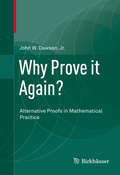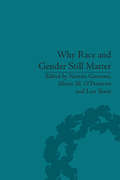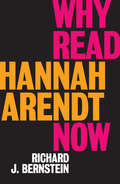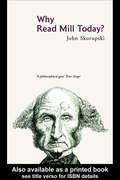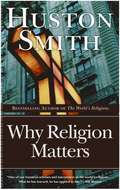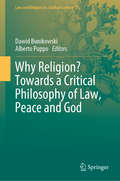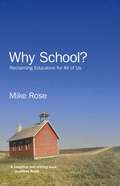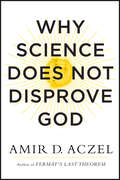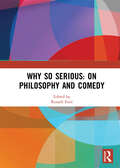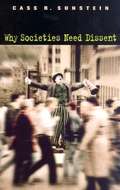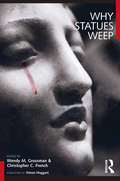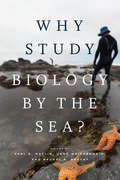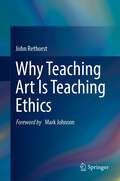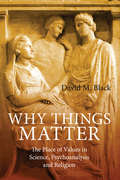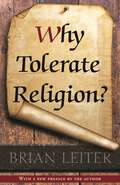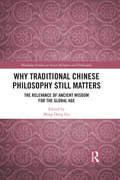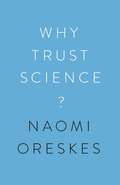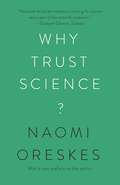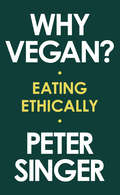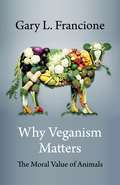- Table View
- List View
Why Prove it Again?
by John W. DawsonThis monograph considers several well-known mathematical theorems and asks the question, "Why prove it again?" while examining alternative proofs. It explores the different rationales mathematicians may have for pursuing and presenting new proofs of previously established results, as well as how they judge whether two proofs of a given result are different. While a number of books have examined alternative proofs of individual theorems, this is the first that presents comparative case studies of other methods for a variety of different theorems. The author begins by laying out the criteria for distinguishing among proofs and enumerates reasons why new proofs have, for so long, played a prominent role in mathematical practice. He then outlines various purposes that alternative proofs may serve. Each chapter that follows provides a detailed case study of alternative proofs for particular theorems, including the Pythagorean Theorem, the Fundamental Theorem of Arithmetic, Desargues' Theorem, the Prime Number Theorem, and the proof of the irreducibility of cyclotomic polynomials. Why Prove It Again? will appeal to a broad range of readers, including historians and philosophers of mathematics, students, and practicing mathematicians. Additionally, teachers will find it to be a useful source of alternative methods of presenting material to their students.
Why Race and Gender Still Matter: An Intersectional Approach
by Lisa Yount Namita Goswami Maeve M. O’DonovanIntersectionality, the attempt to bring theories on race, gender, disability and sexuality together, has existed for decades as a theoretical framework. The essays in this volume explore how intersectionality can be applied to modern philosophy, as well as looking at other disciplines.
Why Read Hannah Arendt Now?
by Richard J. BernsteinRecently there has been an extraordinary international revival of interest in Hannah Arendt. She was extremely perceptive about the dark tendencies in contemporary life that continue to plague us. She developed a concept of politics and public freedom that serves as a critical standard for judging what is wrong with politics today. Richard J. Bernstein argues that Arendt should be read today because her penetrating insights help us to think about both the darkness of our times and the sources of illumination. He explores her thinking about statelessness and refugees; the right to have rights; her critique of Zionism; the meaning of the banality of evil; the complex relations between truth, lying, power, and violence; the tradition of the revolutionary spirit; and the urgent need for each of us to assume responsibility for our political lives. This short and very readable book will be of great interest to anyone who wants to understand the forces that are shaping our world today.
Why Read Mill Today?
by John SkorupskiJohn Stuart Mill is one of the greatest thinkers of the nineteenth century. But does he have anything to teach us today? His deep concern for freedom of the individual is thought by some to be outdated and inadequate to the cultural and religious complexities of twenty first century life. In this succinct and shrewd book, John Skorupski argues that Mill is a profound and inspiring social and political thinker from whom we still have much to learn. He reflects on Mill's central arguments in his most famous works, including Utilitarianism and On Liberty, and traces their implications for democratic politics. With the use of topical and controversial examples, including privacy, religious intolerance, and freedom of speech, he makes Mill's concerns our own at a time when what liberalism means, and why it matters, is once again in dispute. He concludes that Mill's place in the pantheon of 'great thinkers' rests not only on his specific political and social doctrines, but above all on his steadfastly generous and liberal vision of human beings, their relations to one another, and what makes life worth living.
Why Religion Matters
by Huston SmithHuston Smith, the author of the classic bestseller The World's Religions, delivers a passionate, timely message: The human spirit is being suffocated by the dominant materialistic worldview of our times. Smith champions a society in which religion is once again treasured and authentically practiced as the vital source of human wisdom.
Why Religion Matters
by Huston SmithHuston Smith, the author of the classic bestseller The World's Religions, delivers a passionate, timely message: The human spirit is being suffocated by the dominant materialistic worldview of our times. Smith champions a society in which religion is once again treasured and authentically practiced as the vital source of human wisdom.
Why Religion? Towards a Critical Philosophy of Law, Peace and God (Law and Religion in a Global Context #2)
by Dawid Bunikowski Alberto PuppoThis book examines the relation between religion and jurisprudence, God, and peace respectively. It argues that in order to elucidate the possible role religion can play in the contemporary world, it is useful to analyse religion by associating it with other concepts. Why peace? Because peace is probably the greatest promise made by religions and the greatest concern in the contemporary world. Why jurisprudence? Because, quoting Kelsen’s famous book "Peace through Law", peace is usually understood as something achievable by international legal instruments. But what if we replace "Peace through Law" with "Peace through Religion"? Does law, as an instrument for achieving peace, incorporate a religious dimension? Is law, ultimately, a religious and normative construction oriented to peace, to the protection of humanity, in order to keep humans from the violence of nature? Is the hope for peace rational, or just a question of faith? Is religion itself a question of faith or a rational choice? Is the relatively recent legal concept of “responsibility to protect” a secular expression of the oldest duty of humankind?The book follows the structure of interdisciplinary research in which the international legal scholar, the moral philosopher, the philosopher of religion, the theologian, and the political scientist contribute to the construction of the necessary bridges. Moreover, it gives voice to different monotheistic traditions and, more importantly, it analyses religion in the various dimensions in which it determines the authors' cultures: as a set of rituals, as a source of moral norms, as a universal project for peace, and as a political discourse.
Why Religions Matter
by John BowkerWhat are religions? Why is it important to understand them? One answer is that religions and religious believers are extremely bad news: they are deeply involved in conflicts around the globe; they harm people of whom they disapprove; and they often seem irrational. Another answer claims that they are in fact extremely good news: religious beliefs and practices are universal and so fundamental in human nature that they have led us to great discoveries in our explorations of the cosmos and of who we are. The sciences began as part of that religious exploration. John Bowker demonstrates that there is truth in both answers and that we need both to understand what religion is and why it matters. He draws on many disciplines - from physics, genetics and the neurosciences to art, anthropology and the history of religions - to show how they shed entirely new light on religion in the modern world.
Why School?
by Mike RoseWhy School? is a little book driven by big questions. What does it mean to be educated? What is intelligence? How should we think about intelligence, education, and opportunity in an open society? Drawing on forty years of teaching and research and "a profound understanding of the opportunities, both intellectual and economic, that come from education" (Booklist), award-winning author Mike Rose reflects on these and other questions related to public schooling in America. He answers them in beautifully written chapters that are both rich in detail and informed by an extensive knowledge of history, the psychology of learning, and the politics of education.This paperback edition includes three new chapters showing how cognitive science actually narrows our understanding of learning, how to increase college graduation rates, and how to value the teaching of basic skills. An updated introduction by Rose, who has been hailed as "a superb writer and an even better storyteller" (TLN Teachers Network), reflects on recent developments in school reform. Lauded as "a beautifully written work of literary nonfiction" (The Christian Science Monitor) and called "stunning" by the New Educator Journal, Why School? offers an eloquent call for a bountiful democratic vision of the purpose of schooling.
Why Science Does Not Disprove God
by Amir D. AczelThe bestselling author “wields impressive intellectual weapons in demolishing the New Atheists’ claims that science has disproven the existence of God” (Booklist, starred review).The renowned science writer, mathematician, and bestselling author of Fermat’s Last Theorem masterfully refutes the overreaching claims of the “New Atheists,” providing millions of educated believers with a clear, engaging explanation of what science really says, how there’s still much space for the Divine in the universe, and why faith in both God and empirical science are not mutually exclusive.A highly publicized coterie of scientists and thinkers, including Richard Dawkins, the late Christopher Hitchens, and Lawrence Krauss, have vehemently contended that breakthroughs in modern science have disproven the existence of God, asserting that we must accept that the creation of the universe came out of nothing, that religion is evil, that evolution fully explains the dazzling complexity of life, and more. In this much-needed book, science journalist Amir Aczel profoundly disagrees and conclusively demonstrates that science has not, as yet, provided any definitive proof refuting the existence of God.Why Science Does Not Disprove God is his brilliant and incisive analyses of the theories and findings of such titans as Albert Einstein, Roger Penrose, Alan Guth, and Charles Darwin, all of whose major breakthroughs leave open the possibility—and even the strong likelihood—of a Creator. Bolstering his argument, Aczel lucidly discourses on arcane aspects of physics to reveal how quantum theory, the anthropic principle, the fine-tuned dance of protons and quarks, the existence of anti-matter and the theory of parallel universes, also fail to disprove God.“[An] intelligent and stimulating book.” —The Washington Post
Why So Serious: On Philosophy and Comedy (Angelaki: New Work in the Theoretical Humanities)
by Russell FordThe Western philosophical tradition shows a marked fondness for tragedy. From Plato and Aristotle, through German idealism, to contemporary reflections on the murderous violence of the twentieth century, philosophy has often looked to tragedy for resources to make suffering, grief, and death thinkable. But what if showing a preference for tragedy, philosophical thought has unwittingly and unknowingly aligned itself with a form of thinking that accepts injustice without protest?This collection explores possibilities for philosophical thinking that refuses the tragic model of thought, and turns instead to its often-overlooked companion: comedy. Comprising of a series of experiments ranging across the philosophical tradition, the essays in this volume propose to break, or at least suspend, the use of tragedy as an index of truth and philosophical worth. Instead, they explore new conceptions of solidarity, sympathy, critique, and justice.In addition, the essays collected here provide ample reason to believe that philosophical thinking, aligned with comedy, is capable of important and original insights, discoveries, and creations. The prejudicial acceptance of tragic seriousness only impoverishes the life of thought; it can be rejuvenated and renewed by laughter and the comic. This book was originally published as a special issue of Angelaki.
Why Societies Need Dissent
by Cass R. SunsteinIn this timely book, Cass R. Sunstein shows that organizations and nations are far more likely to prosper if they welcome dissent and promote openness. Attacking "political correctness" in all forms, Sunstein demonstrates that corporations, legislatures, even presidents are likely to blunder if they do not cultivate a culture of candor and disclosure. He shows that unjustified extremism, including violence and terrorism, often results from failure to tolerate dissenting views. The tragedy is that blunders and cruelties could be avoided if people spoke out. <p><p> Sunstein casts new light on freedom of speech, showing that a free society not only forbids censorship but also provides public spaces for dissenters to expose widely held myths and pervasive injustices. He provides evidence about the effects of conformity and dissent on the federal courts. The evidence shows not only that Republican appointees vote differently from Democratic appointees but also that both Republican and Democratic judges are likely to go to extremes if unchecked by opposing views. Understanding the need for dissent illuminates countless social debates, including those over affirmative action in higher education, because diversity is indispensable to learning. <p> Dissenters are often portrayed as selfish and disloyal, but Sunstein shows that those who reject pressures imposed by others perform valuable social functions, often at their own expense. This is true for dissenters in boardrooms, churches, unions, and academia. It is true for dissenters in the White House, Congress, and the Supreme Court. And it is true during times of war and peace.
Why Statues Weep: The Best of the "Skeptic"
by Christopher C. French Wendy M. GrossmanFirst Published in 2016. Routledge is an imprint of Taylor & Francis, an Informa company.
Why Study Biology by the Sea? (Convening Science: Discovery at the Marine Biological Laboratory)
by Jane Maienschein Rachel A. Ankeny Karl S. MatlinFor almost a century and a half, biologists have gone to the seashore to study life. The oceans contain rich biodiversity, and organisms at the intersection of sea and shore provide a plentiful sampling for research into a variety of questions at the laboratory bench: How does life develop and how does it function? How are organisms that look different related, and what role does the environment play? From the Stazione Zoologica in Naples to the Marine Biological Laboratory in Woods Hole, the Amoy Station in China, or the Misaki Station in Japan, students and researchers at seaside research stations have long visited the ocean to investigate life at all stages of development and to convene discussions of biological discoveries. Exploring the history and current reasons for study by the sea, this book examines key people, institutions, research projects, organisms selected for study, and competing theories and interpretations of discoveries, and it considers different ways of understanding research, such as through research repertoires. A celebration of coastal marine research, Why Study Biology by the Sea? reveals why scientists have moved from the beach to the lab bench and back.
Why Study Biology by the Sea? (Convening Science: Discovery at the Marine Biological Laboratory)
by Jane Maienschein Rachel A. Ankeny Karl S. MatlinFor almost a century and a half, biologists have gone to the seashore to study life. The oceans contain rich biodiversity, and organisms at the intersection of sea and shore provide a plentiful sampling for research into a variety of questions at the laboratory bench: How does life develop and how does it function? How are organisms that look different related, and what role does the environment play? From the Stazione Zoologica in Naples to the Marine Biological Laboratory in Woods Hole, the Amoy Station in China, or the Misaki Station in Japan, students and researchers at seaside research stations have long visited the ocean to investigate life at all stages of development and to convene discussions of biological discoveries. Exploring the history and current reasons for study by the sea, this book examines key people, institutions, research projects, organisms selected for study, and competing theories and interpretations of discoveries, and it considers different ways of understanding research, such as through research repertoires. A celebration of coastal marine research, Why Study Biology by the Sea? reveals why scientists have moved from the beach to the lab bench and back.
Why Study Biology by the Sea? (Convening Science: Discovery at the Marine Biological Laboratory)
by Jane Maienschein Rachel A. Ankeny Karl S. MatlinFor almost a century and a half, biologists have gone to the seashore to study life. The oceans contain rich biodiversity, and organisms at the intersection of sea and shore provide a plentiful sampling for research into a variety of questions at the laboratory bench: How does life develop and how does it function? How are organisms that look different related, and what role does the environment play? From the Stazione Zoologica in Naples to the Marine Biological Laboratory in Woods Hole, the Amoy Station in China, or the Misaki Station in Japan, students and researchers at seaside research stations have long visited the ocean to investigate life at all stages of development and to convene discussions of biological discoveries. Exploring the history and current reasons for study by the sea, this book examines key people, institutions, research projects, organisms selected for study, and competing theories and interpretations of discoveries, and it considers different ways of understanding research, such as through research repertoires. A celebration of coastal marine research, Why Study Biology by the Sea? reveals why scientists have moved from the beach to the lab bench and back.
Why Teaching Art Is Teaching Ethics
by John RethorstThis exhaustively-researched, carefully-focused book asks whether imagination, emotion and art can enlighten our sense of right and wrong, looking at this question through the lens of moral philosophy with contributions from cognitive science, psychology and neurology.If moral thinking is simply logical reasoning or following God-given law, why did the poet Shelley say that “the great instrument of moral good is the imagination”? Why does ethical reasoning tend towards absolutes: something is either right or wrong, period, while a thoughtful minority values the “priority of the particular” – that unique aspects of a situation may come closer to the heart of the matter than any general rules could? Are emotions, as many philosophers in history have theorized, only a distraction from the clear perception of duty, or do feelings add something important, even critical, to how we judge good and bad, right and wrong? Can great works of art and literature embody imagination, the particular, and emotions to illuminate human life in ways crucial to ethical thinking?This book introduces an original idea in philosophy, “moral density,” which for the first time elucidates the profound relation between art and ethics. Written for the literate layperson, an academic or technical background is not necessary, so this book will be of interest not only to philosophers and educators, but to all who are concerned with what is good, and how to see it and teach it.
Why They Die: Civilian Devastation in Violent Conflict
by Rothbart Daniel Korostelina Karina V."A welcome contribution to our understanding of the process at work in societies in conflict---a process that can occur even before the fighting begins---this book convincingly argues the need to bring civilians, who are often not at the center of conflict analysis, to the forefront of any discussion of conflict through an examination of anti-civilian ideology and the construction of the Other in terms of the positioning of boundaries. " ---Kristen P. Williams, Clark University "The authors convincingly dismiss conventional accounts---collateral damage is unavoidable, war is hell, etc. ---and insist that the insights of identity studies can provide a more complete perspective on this issue. " ---John Parry, Lewis & Clark Law School "Why They Dieis a work of imagination and insight. Based on wide reading and deep reflection, the authors have adopted a case study method to illustrate why it is that civilians are so often targeted in modern conflict, and why this development is such a departure from earlier forms of warfare. Rather than being that unfortunate phenomenon 'collateral damage,' as so often claimed by military theorists, the modern world has seen a situation where the destruction of civilian lives has all too often become the object of combatant behaviors. Rothbart and Korostelina have shown why this has happened, and how such behaviors can be explained. All in all, this is an excellent and worthy addition to a growing literature of mass murder, mayhem, and destruction. " ---Paul R. Bartrop, Bialik College, Melbourne, Australia Why do civilians suffer most during times of violent conflict? Why are civilian fatalities as much as eight times higher, calculated globally for current conflicts, than military fatalities? InWhy They Die, Daniel Rothbart and Karina V. Korostelina address these questions through a systematic study of civilian devastation in violent conflicts. Pushing aside the simplistic definition of war as a guns-and-blood battle between two militant groups, the authors investigate the identity politics underlying conflicts of many types. During a conflict, all those on the opposite side are perceived as the enemy, with little distinction between soldiers and civilians. As a result, random atrocities and systematic violence against civilian populations become acceptable. Rothbart and Korostelina devote the first half of the book to case studies: deportation of the Crimean Tatars from the Ukraine, genocide in Rwanda, the Lebanon War, and the war in Iraq. With the second half, they present new methodological tools for understanding different types of violent conflict and discuss the implications of these tools for conflict resolution. Jacket photograph: © iStockphoto. com/Tina Rencelj
Why Things Matter: The Place of Values in Science, Psychoanalysis and Religion
by David BlackIn this book, David M. Black asks questions such as 'why do we care?' and 'what gives our values power?' using ideas from psychoanalysis and its adjacent sciences such as neuroscience and evolutionary biology in order to do so. Why Things Matter explores how the comparatively new scientific discipline of consciousness studies requires us to recognize that subjectivity is as irreducible a feature of the world as matter and energy. Necessarily inter-disciplinary, this book draws on science, philosophy and the history of religion to argue that there can be influential values which are not based exclusively on biological need or capricious life-style choices. It suggests that many recent scientific critics of religion, including Freud, have failed to see clearly the issues at stake. This book will be key reading for psychoanalysts and psychotherapists as well as counsellors with an interest in the basis of religious feeling and in moral and aesthetic values. The book will also be of interest to scholars of psychoanalysis, philosophy and religion.
Why Tolerate Religion?: Updated Edition
by Brian LeiterWhy it's wrong to single out religious liberty for special legal protectionsThis provocative book addresses one of the most enduring puzzles in political philosophy and constitutional theory—why is religion singled out for preferential treatment in both law and public discourse? Why are religious obligations that conflict with the law accorded special toleration while other obligations of conscience are not? In Why Tolerate Religion?, Brian Leiter shows why our reasons for tolerating religion are not specific to religion but apply to all claims of conscience, and why a government committed to liberty of conscience is not required by the principle of toleration to grant exemptions to laws that promote the general welfare.
Why Traditional Chinese Philosophy Still Matters: The Relevance of Ancient Wisdom for the Global Age
by Ming Dong GuTraditional Chinese philosophy, if engaged at all, is often regarded as an object of antiquated curiosity and dismissed as unimportant in the current age of globalization. Written by a team of internationally renowned scholars, this book, however, challenges this judgement and offers an in-depth study of pre-modern Chinese philosophy from an interdisciplinary perspective. Exploring the relevance of traditional Chinese philosophy for the global age, it takes a comparative approach, analysing ancient Chinese philosophy in its relation to Western ideas and contemporary postmodernist theories. The conversation extends over a broad spectrum of philosophical areas and themes, ranging from metaphysics, hermeneutics, political theory, religion and aesthetics to specific philosophical schools including Confucianism, Daoism, and Buddhism. By engaging many time-honoured philosophical issues from a comparative perspective, this book bridges the gap between Eastern and Western thought and emphasises the need for a newly fortified global humanism and a deeper appreciation of different philosophical and religious values in an age gripped by large-scale crises. Arguing that traditional Chinese philosophy has immediate relevance to the many challenges of modern life, this book will be useful to students and scholars of Asian Philosophy and Asian Studies in general.
Why Trust Science?
by Naomi OreskesWhy the social character of scientific knowledge makes it trustworthyDo doctors really know what they are talking about when they tell us vaccines are safe? Should we take climate experts at their word when they warn us about the perils of global warming? Why should we trust science when our own politicians don't? In this landmark book, Naomi Oreskes offers a bold and compelling defense of science, revealing why the social character of scientific knowledge is its greatest strength—and the greatest reason we can trust it.Tracing the history and philosophy of science from the late nineteenth century to today, Oreskes explains that, contrary to popular belief, there is no single scientific method. Rather, the trustworthiness of scientific claims derives from the social process by which they are rigorously vetted. This process is not perfect—nothing ever is when humans are involved—but she draws vital lessons from cases where scientists got it wrong. Oreskes shows how consensus is a crucial indicator of when a scientific matter has been settled, and when the knowledge produced is likely to be trustworthy.Based on the Tanner Lectures on Human Values at Princeton University, this timely and provocative book features critical responses by climate experts Ottmar Edenhofer and Martin Kowarsch, political scientist Jon Krosnick, philosopher of science Marc Lange, and science historian Susan Lindee, as well as a foreword by political theorist Stephen Macedo.
Why Trust Science? (The\university Center For Human Values Ser. #3)
by Naomi OreskesWhy the social character of scientific knowledge makes it trustworthyAre doctors right when they tell us vaccines are safe? Should we take climate experts at their word when they warn us about the perils of global warming? Why should we trust science when so many of our political leaders don't? Naomi Oreskes offers a bold and compelling defense of science, revealing why the social character of scientific knowledge is its greatest strength—and the greatest reason we can trust it. Tracing the history and philosophy of science from the late nineteenth century to today, this timely and provocative book features a new preface by Oreskes and critical responses by climate experts Ottmar Edenhofer and Martin Kowarsch, political scientist Jon Krosnick, philosopher of science Marc Lange, and science historian Susan Lindee, as well as a foreword by political theorist Stephen Macedo.
Why Vegan?: Eating Ethically (Penguin Great Ideas Ser.)
by Peter SingerIn a world reeling from a global pandemic, never has a treatise on veganism—from our foremost philosopher on animal rights—been more relevant or necessary. “Peter Singer may be the most controversial philosopher alive; he is certainly among the most influential.” —The New Yorker Even before the publication of his seminal Animal Liberation in 1975, Peter Singer, one of the greatest moral philosophers of our time, unflinchingly challenged the ethics of eating animals. Now, in Why Vegan?, Singer brings together the most consequential essays of his career to make this devastating case against our failure to confront what we are doing to animals, to public health, and to our planet. From his 1973 manifesto for Animal Liberation to his personal account of becoming a vegetarian in “The Oxford Vegetarians” and to investigating the impact of meat on global warming, Singer traces the historical arc of the animal rights, vegetarian, and vegan movements from their embryonic days to today, when climate change and global pandemics threaten the very existence of humans and animals alike. In his introduction and in “The Two Dark Sides of COVID-19,” cowritten with Paola Cavalieri, Singer excoriates the appalling health hazards of Chinese wet markets—where thousands of animals endure almost endless brutality and suffering—but also reminds westerners that they cannot blame China alone without also acknowledging the perils of our own factory farms, where unimaginably overcrowded sheds create the ideal environment for viruses to mutate and multiply. Spanning more than five decades of writing on the systemic mistreatment of animals, Why Vegan? features a topical new introduction, along with nine other essays, including: • “An Ethical Way of Treating Chickens?,” which opens our eyes to the lives of the birds who end up on so many plates—and to the lives of their parents; • “If Fish Could Scream,” an essay exposing the utter indifference of commercial fishing practices to the experiences of the sentient beings they scoop from the oceans in such unimaginably vast numbers; • “The Case for Going Vegan,” in which Singer assembles his most powerful case for boycotting the animal production industry; • And most recently, in the introduction to this book and in “The Two Dark Sides of COVID-19,” Singer points to a new reason for avoiding meat: the role eating animals has played, and will play, in pandemics past, present, and future. Written in Singer’s pellucid prose, Why Vegan? asserts that human tyranny over animals is a wrong comparable to racism and sexism. The book ultimately becomes an urgent call to reframe our lives in order to redeem ourselves and alter the calamitous trajectory of our imperiled planet.
Why Veganism Matters: The Moral Value of Animals (Critical Perspectives on Animals: Theory, Culture, Science, and Law)
by Gary FrancioneMost people care about animals, but only a tiny fraction are vegan. The rest often think of veganism as an extreme position. They certainly do not believe that they have a moral obligation to become vegan.Gary L. Francione—the leading and most provocative scholar of animal rights theory and law—demonstrates that veganism is a moral imperative and a matter of justice. He shows that there is a contradiction in thinking that animals matter morally if one is also not vegan, and he explains why this belief should logically lead all who hold it to veganism. Francione dismantles the conventional wisdom that it is acceptable to use and kill animals as long as we do so “humanely.” He argues that if animals matter morally, they must have the right not to be used as property. That means that we cannot eat them, wear them, use them, or otherwise treat them as resources or commodities.Why Veganism Matters presents the case for the personhood of nonhuman animals and for veganism in a clear and accessible way that does not require any philosophical or legal background. This book offers a persuasive and powerful argument for all readers who care about animals but are not sure whether they have a moral obligation to be vegan.
